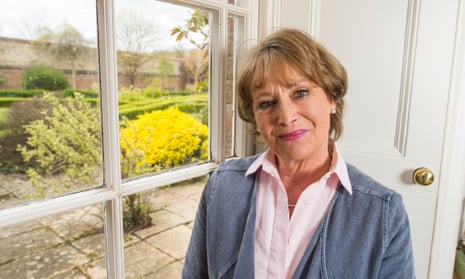“In the book business, when you have had a success, the smart thing to do is write the same sort of thing once a year for the rest of your life,” explains Ken Follett, in the introduction to his 1989 bestseller The Pillars of the Earth. Follett ignored that advice, frightening his publishers by abandoning thrillers to embark on a historical epic. Now Minette Walters – formerly the multimillion-selling “queen of psychological crime” – has gambled on the same change of direction. After retiring from the genre she helped popularise, amid much speculation about burnout or writer’s block, she has spent most of the last decade working on a mammoth two-part historical saga set in her home county of Dorset during the early ravages of the Black Death.
There’s no shortage of corpses in these 500-plus pages, including a murder victim, but The Last Hours is not historical crime; the influence seems rather to have been Follett’s Kingsbridge novels, with their multiple story lines and large cast. In the summer of 1348, Lady Anne of Develish is shaping her humble demesne into one of the most productive and harmonious in the county, thanks to her unusually progressive ideas about healthcare and literacy among her serfs, and despite resistance from her boorish Norman husband Sir Richard and petulant teenage daughter Eleanor. While visiting a neighbouring manor to secure Eleanor’s marriage, Sir Richard succumbs to an unknown illness: his shrewd captain notices mass graves and deserted villages along the way. When a messenger arrives in Develish forewarning that “a Black Death has fallen upon our land”, Lady Anne – who from her convent upbringing has learned the importance of segregating the sick – orders her people inside the boundary walls of her moated manor house. The gates are barred to all comers including her ailing husband and his retinue, who are left to die unshriven in the village.
This self-imposed isolation quickly breeds tensions in the small community as supplies run short and the iron-clad hierarchies of the feudal system begin to crumble. Class-consciousness afflicts every character here with an oddly modern awareness, as the devastation outside causes some to question the old certainties about divine punishment and favour.
There’s no doubt whose side the author is on; for the most part those with the least right to power – women, bastards and serfs – are repositories of practical good sense and grit, while aristocrats and priests are venal hypocrites and cowards. Though this makes for less than complex characters, it does allow enjoyably straightforward heroes and villains, and The Last Hours is in part a morality tale; anyone who believes their birth or title sets them above their fellows will quickly learn a lesson in equality. “Is it really so hard to see that a serf is as much a person as you are, as loved by God and as deserving of happiness?” Lady Anne asks her rebellious daughter, with admirable if anachronistic sentiment.
Walters portrays the plague’s effects with the unflinching detail she brought to rotting and dismembered bodies in her earlier novels. Her descriptions of the Dorset landscape, the organisation of the manor and its lands, and techniques of hunting and household management show evidence of careful research, so it’s noticeable against this backdrop that her characters often remain stubbornly contemporary in their outlook. “I question why a man of your age would find my fourteen-year-old daughter so interesting,” Lady Anne accuses her husband’s steward, displaying a 21st-century squeamishness (you’d think she could hazard a guess, since she gave birth to this daughter at 14). But there are echoes throughout of the brutality meted out to young girls in Walters’s previous fiction, from the young rape victims in Disordered Minds to the abused Muna in her recent Hammer novella The Cellar; a suggestion that the human capacity for preying on the vulnerable remains constant through the centuries.
Walters’s crime novels are admired for their claustrophobic atmosphere and precision-engineered suspense. With The Last Hours, she has swapped that taut plotting for a more expansive structure and ambitiously broad canvas. Whether it will win over her previous fans remains to be seen but, as the inhabitants of Develish discover, striking out for the unknown is a worthwhile adventure, whatever the outcome.

Comments (…)
Sign in or create your Guardian account to join the discussion